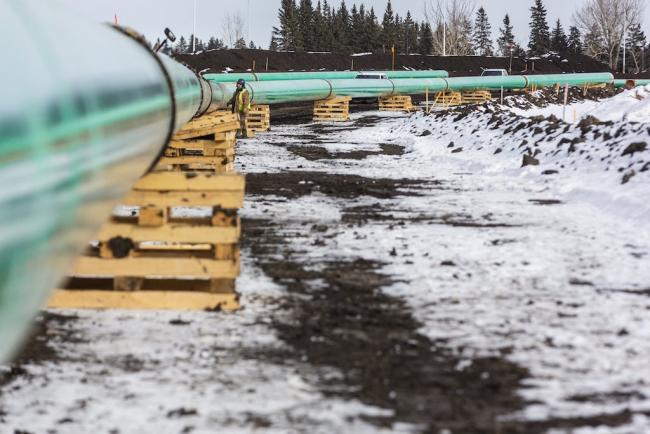Articles Menu

December 9th 2020
Canada’s parliamentary budget officer has provoked a fresh round of suspicion about the long-term profitability of the Trans Mountain oil pipeline and expansion project.
The Dec. 8 report by Yves Giroux concludes that the government’s decision in 2018 to purchase and run the pipeline remains a profitable move only if Ottawa doesn’t take further steps to combat climate change, and if the planet maintains its unquenchable thirst for oil.
Both such scenarios are not guaranteed. The government itself has repeatedly said it will make its climate policy more stringent, including by ratcheting up its emissions target for 2030. And everyone from the fossil fuel giant BP to the oil export group OPEC have slashed their long-term oil demand forecasts.
The report caused NDP finance critic Peter Julian to call on Prime Minister Justin Trudeau on Tuesday to “stop rolling the dice on Trans Mountain” and to invest any further funding into “clean energy production.”
The federal government says it is not its intention to maintain ownership of the pipeline system for longer than it takes to complete the expansion project, “and beyond if that is necessary to protect the government’s investment,” as former finance minister Bill Morneau put it in 2018.
The government says it intends to divest from the asset after engagement with Indigenous communities, and that it remains committed to investing any earned dollars into clean energy projects.
Meanwhile, Environment Minister Jonathan Wilkinson has said there are “lots of different forecasts” concerning global energy demand, and that the next two decades will be a period of “transition” away from carbon-polluting fuels.
Giroux's report is an update to one his office published in January 2019, which indicated the government faced a significant risk of having overpaid for the project after shelling out “at the higher end” of its value.
Tuesday's report asserts that “the profitability of the Trans Mountain assets is highly contingent on the climate policy stance of the federal government.” If climate policy “continues to become more stringent,” wrote Giroux, it is possible for the value of the Trans Mountain assets to turn negative.
The Trudeau Liberals have tabled legislation, currently at second reading in the House of Commons, to reach net-zero emissions by 2050. Net-zero emissions means that any carbon pollution emitted from burning fossil fuels like coal, oil or natural gas are offset with other initiatives like carbon-capture technology.
As well, Giroux noted that four-fifths of the pipeline’s use has been secured in the form of long-term contracts with energy companies to carry their fossil fuels, with the companies having agreed to pay even if they don’t provide the material for transport.
Canada’s parliamentary budget officer has provoked a fresh round of suspicion about the long-term profitability of the Trans Mountain oil pipeline and expansion project. #TMX #cdnpoli - Twitter
But, he added, “there is uncertainty around how much of the remaining 20 per cent capacity of the expanded pipeline system will be used.”
The tolls that the pipeline charges energy firms for this remaining space are higher than for the long-term contracts, but there is no requirement for shippers to use it, wrote Giroux.
There is also uncertainty around whether shippers will reapply for more long-term contracts after their existing ones expire.
Canada expects its crude oil production to continue climbing over the next two decades, but it could peak in 2039, according to federal energy regulator projections. In that scenario, the capacity coming from other pipelines would be more than enough to handle future crude oil growth, it said.
“In light of certain scenarios for oil supply in recent energy market projections, there is a risk that shippers will choose to not re-enter into committed contracts in the 2040s,” wrote Giroux.
If energy firms don’t re-enter these contracts, the tolls would change to equal the total cost of providing service, Giroux said — meaning a “less lucrative” outcome for Trans Mountain and a lowered value.
Analysts have also raised concerns about the long-term ability of Canada’s oilpatch to sell its mostly heavy, sulphur-rich crude oil to markets outside the United States, where 98 per cent of Canada’s oil exports are destined.
Finally, there are questions about when exactly the expanded pipeline will open for business, and whether the COVID-19 pandemic will delay the effort.
Giroux pointed out that the Crown corporation that owns and operates the pipeline has indicated in company reports that the pandemic “may increase certain risks related to development of the expansion project schedule.”
This past fall, sworn statements to regulators and construction plans appeared to indicate that Trans Mountain missed a key window for work near waterways to begin this year, meaning that construction could be delayed by two months or more.
The company has remained steadfast in its position, as it said again last month, that the expansion project’s schedule “remains intact with a planned in-service date of December 2022.”
Carl Meyer / Local Journalism Initiative / Canada’s National Observer
[Top photo: The federal government says it is not its intention to maintain ownership of the Trans Mountain pipeline system for longer than it takes to complete the expansion project. Photo by TMX / Facebook]